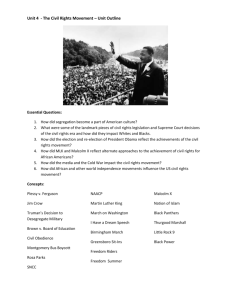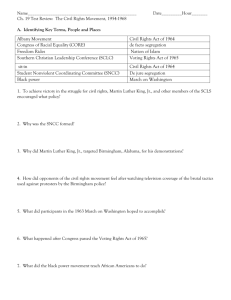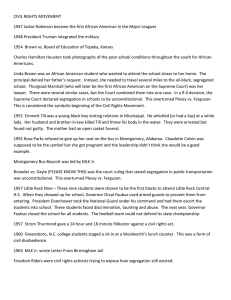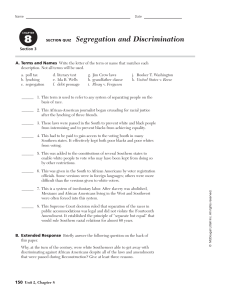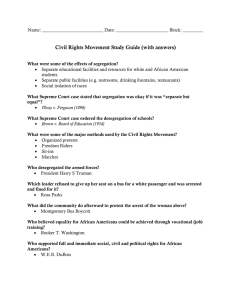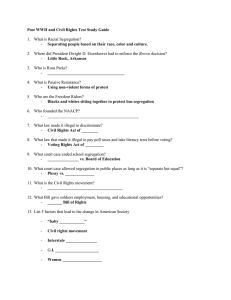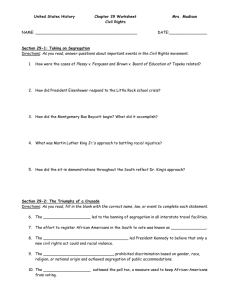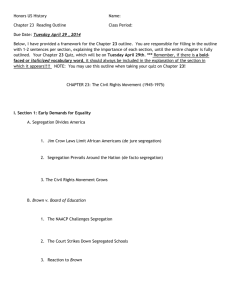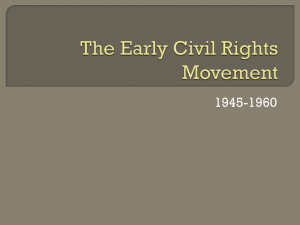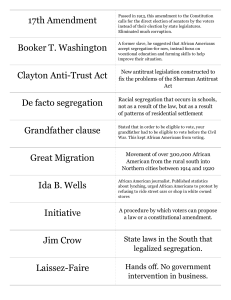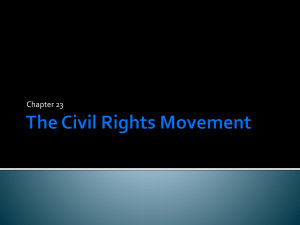The Civil Rights Movement Unit Assignment Directions: Read
advertisement
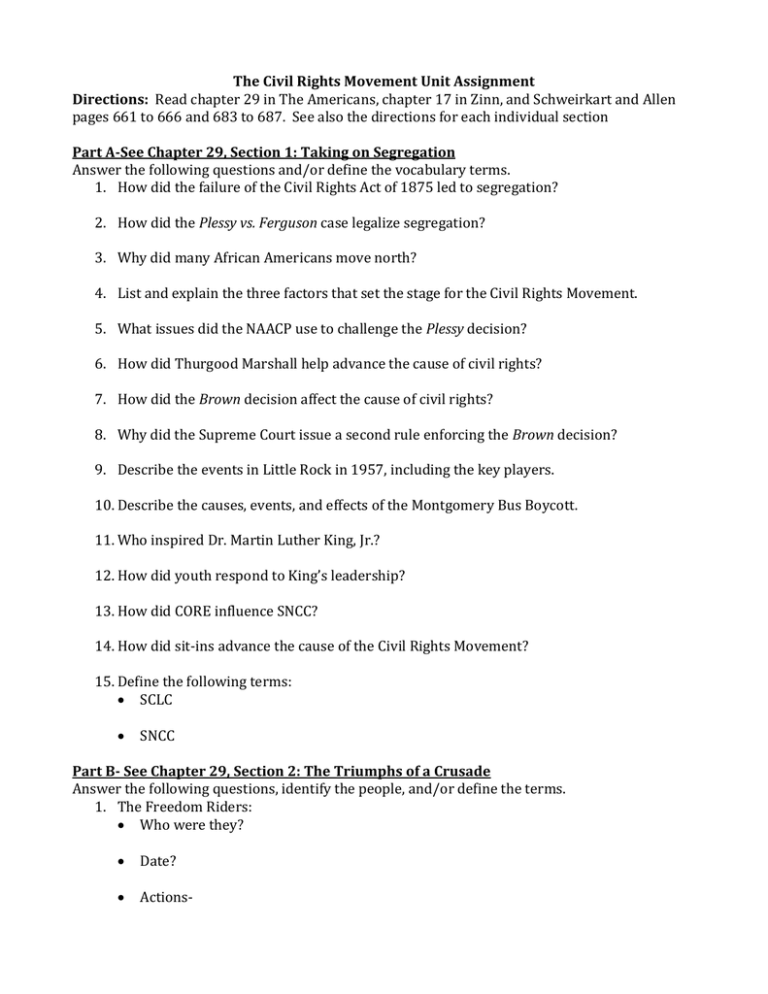
The Civil Rights Movement Unit Assignment Directions: Read chapter 29 in The Americans, chapter 17 in Zinn, and Schweirkart and Allen pages 661 to 666 and 683 to 687. See also the directions for each individual section Part A-See Chapter 29, Section 1: Taking on Segregation Answer the following questions and/or define the vocabulary terms. 1. How did the failure of the Civil Rights Act of 1875 led to segregation? 2. How did the Plessy vs. Ferguson case legalize segregation? 3. Why did many African Americans move north? 4. List and explain the three factors that set the stage for the Civil Rights Movement. 5. What issues did the NAACP use to challenge the Plessy decision? 6. How did Thurgood Marshall help advance the cause of civil rights? 7. How did the Brown decision affect the cause of civil rights? 8. Why did the Supreme Court issue a second rule enforcing the Brown decision? 9. Describe the events in Little Rock in 1957, including the key players. 10. Describe the causes, events, and effects of the Montgomery Bus Boycott. 11. Who inspired Dr. Martin Luther King, Jr.? 12. How did youth respond to King’s leadership? 13. How did CORE influence SNCC? 14. How did sit-ins advance the cause of the Civil Rights Movement? 15. Define the following terms: SCLC SNCC Part B- See Chapter 29, Section 2: The Triumphs of a Crusade Answer the following questions, identify the people, and/or define the terms. 1. The Freedom Riders: Who were they? Date? Actions- How did violence against the freedom riders affect President Kennedy? 2. March on Birmingham: How did the television coverage of the Birmingham marches affect legislation? Why was Dr. King put into jail? 3. The March on Washington: Why did civil rights activists organize the March on Washington? What famous speech was given at the March? 4. What prevented millions of African Americans from voting in the South? 5. Identify the following people and their actions during the Civil Rights Movement: James Farmer James Meredith- Eugene “Bull” Connor- Medgar Evers- John F. Kennedy- Lyndon B. Johnson- Fannie Lou Hamer- Jimmy Lee Jackson- 6. Define the following terms: Civil Rights Act of 1964 Freedom Summer- Voting Rights Act of 1965Part C-See Chapter 29, Section 3: Challenges and Changes in the Movement Take notes on the following concepts/topics. I. Northern Segregation a. De facto segregationb. De jure segregationII. Urban Violence a. Harlem- b. Watts, Los Angelesc. Reactions to violenceIII. Nation of Islam a. Beliefsb. Malcolm Xc. Assassination of Malcolm X- IV. Black Power a. Definitionb. Stokely Carmichael- V. Black Panthers a. Foundersb. Beliefsc. Actions (positive & negative)- VI. Assassination of Dr. King a. Dateb. Assassinc. Locationd. Reactions to King’s Death- VII. Legacy of the Movementa. Kerner Commissionb. Civil Rights Act of 1968c. Greater Prided. Political Gainse. Remaining Issuesf. Affirmative Actioni. Definitionii. Purpose/goal- iii. “Reverse Discrimination?” Part D: See S & A (Blue Book) Pages 661 to 666 and 683 to 687 Identify each of the following and/or complete the statement. 1. Eisenhower’s position on civil rights… 2. Examples of voter discrimination3. Ralph Abernathy4. Greensboro sit-in5. Dr. King’s essential insight was… 6. FBI Director J. Edgar Hoover watched Dr. King and civil rights organizations because… 7. Equal Employment Opportunity Commission8. National Advisory Commission on Civil Disorders (1968)9. Some of the issues facing Dr. King at the time of his death were… 10. Dr. King’s “I’ve been on the mountaintop” speechPart E-See Zinn Chapter 17 Answer each of the following questions. 1. How did the arts reflect the thoughts of black society? Provide specific examples. 2. List the recommendations of Truman’s Committee on Civil Rights (1946). 3. How did the protest in Montgomery “forecast” the coming “vast protest movement”? 4. Describe the behavior of the freedom riders in jail (1961). 5. What happened to James Chaney, Andrew Goodman and, Michael Schwerner during the Mississippi (Freedom) Summer (1964)? 6. Why did many African Americans feel that the voting and civil rights acts were not enough to solve the various race issues? 7. What year saw the greatest urban riots in American history? How many were there? 8. Why did Dr. King become a chief target of the FBI? 9. What is meant by the term “black capitalism”? 10. What sort of issues did African Americans still face in the late 1970s?
